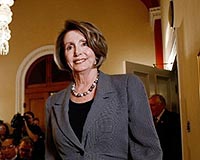| . |  |
. |
Paris (AFP) May 26, 2009 The world's biggest carbon polluters made headway in talks here Tuesday on how to beef up funding to help poor countries in the firing line of climate change, senior officials said. The so-called Major Economies Forum (MEF) advanced on one of the key issues troubling negotiations for a new global treaty due to be crafted in Copenhagen in December, they said. "We made progress on a major subject, which is finance and financial architecture. It's not final, but one feels that there is a real consensus," said French Ecology Minister Jean-Louis Borloo at the end of the two-day MEF meeting. Todd Stern, the US special envoy for climate change, agreed. "We had quite constructive discussions, candid, frank," Stern told a press conference. "We made particularly good progress on the area of financing, which I would say is one of the two biggest issues in the Copenhagen negotiations." The Copenhagen accord would take effect from 2012, after the current commitments of the UN's Kyoto Protocol expire. The marathon process resumes in Bonn next Monday with talks aimed at hammering out a negotiation blueprint. But developing and industrialised economies are far apart about how much money should be raised to help poor countries most exposed to the impacts of changing weather patterns. Another stumbling block is how far countries will vow to cut their emissions of heat-trapping carbon gases in the coming decades. Scientists say swingeing reductions are needed to stave off potential catastrophe. Both Borloo and Stern said the MEF environment ministers showed interest in a so-called "Green Fund" proposed by Mexico last year. Contributions to the fund would be based on a country's gross domestic product (GDP) and its share of the world's carbon pollution. "I don't have any objections to it," said Stern. "We have to go through the details of it and look at it carefully so I am not signing on to every jot and tittle, but (we thought it was) a general good idea and a highly constructive contribution." The MEF, launched by US President Barack Obama last month on the back of an initiative by his predecessor, George W. Bush, aims at speeding the search for common ground among countries that together account for around 80 percent of annual greenhouse-gas emissions. It then intends to hand this consensus for approval by the UN Framework Convention on Climate Change (UNFCCC), the sprawling 192-nation global arena. The MEF's participants include Australia, Brazil, Britain, Canada, China, France, Germany, India, Indonesia, Italy, Japan, South Korea, Mexico, Russia, South Africa and the United States, as well as the European Union. The forum's next meeting will be in Mexico on June 22-23, ahead of likely summit-level talks at the Group of Eight gathering in Italy in July. Stern defended Washington from criticism that Obama, despite scrapping most of Bush's climate policies, could do more. China has demanded rich countries reduce their annual emissions by at least 40 percent by 2020 compared with 1990 levels. The European Union is unilaterally targeting a 20-percent cut by 2020 over 1990 and is offering to deepen this to 30 percent if other advanced economies follow suit. By comparison, a bill making its way through Congress would reduce America's emissions by 17 percent by 2020 compared with their 2005 level, which Stern said was equivalent to a reduction of four percent over 1990. But, he argued, the United States was probably the only country to put forward "a hard mandatory policy" of targeted cuts all the way to 2050, when its greenhouse-gas levels would be 83 percent less than in 2005. "We are actually quite close to being on the same page," he said of European countries. And he suggested the way forward lay in a tailored agreement that abandoned a simple like-for-like comparison of national pledges of emissions cuts. "The notion that the European Union might have a target of X and we might have a target of Y, as long as they are both quite strong targets, that can be accommodated in an agreement depending on how you structure the agreement," he said. Share This Article With Planet Earth
Related Links Climate Science News - Modeling, Mitigation Adaptation
 Climate change a 'game changer' in US-China relations: Pelosi
Climate change a 'game changer' in US-China relations: PelosiBeijing (AFP) May 26, 2009 US House of Representatives speaker Nancy Pelosi said Tuesday that the fight against climate change was a "game changer" in China-US relations, as she visited Beijing on a trip focused on energy. Pelosi, a tough critic of China's human rights record and a vocal advocate of environmental protection, is leading a delegation from the US Congress to China on a working visit devoted to energy and ... read more |
|
| The content herein, unless otherwise known to be public domain, are Copyright 1995-2009 - SpaceDaily. AFP and UPI Wire Stories are copyright Agence France-Presse and United Press International. ESA Portal Reports are copyright European Space Agency. All NASA sourced material is public domain. Additional copyrights may apply in whole or part to other bona fide parties. Advertising does not imply endorsement,agreement or approval of any opinions, statements or information provided by SpaceDaily on any Web page published or hosted by SpaceDaily. Privacy Statement |